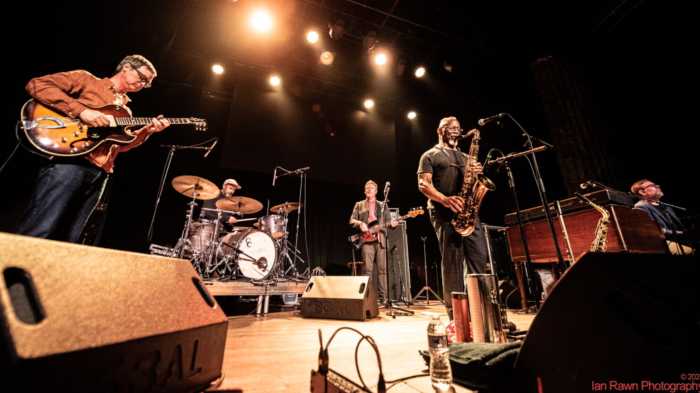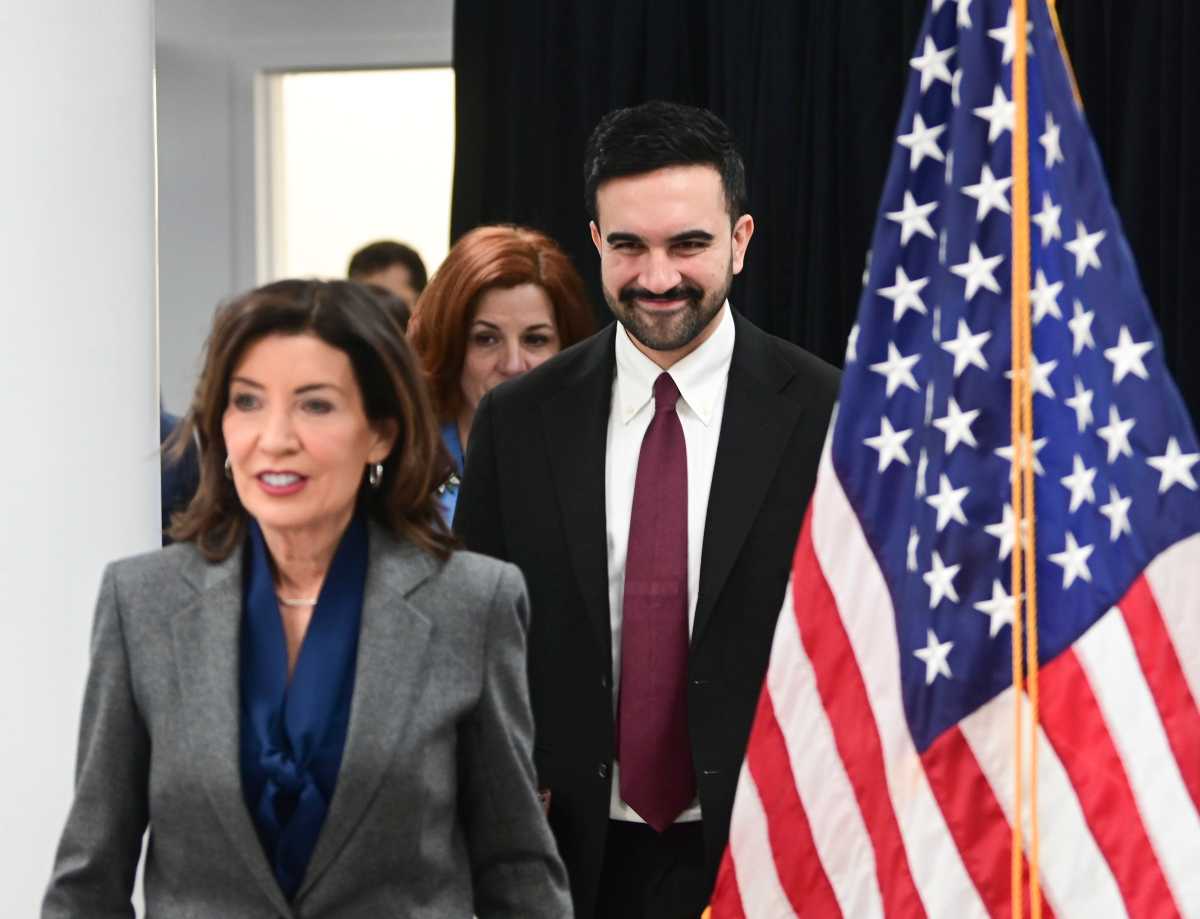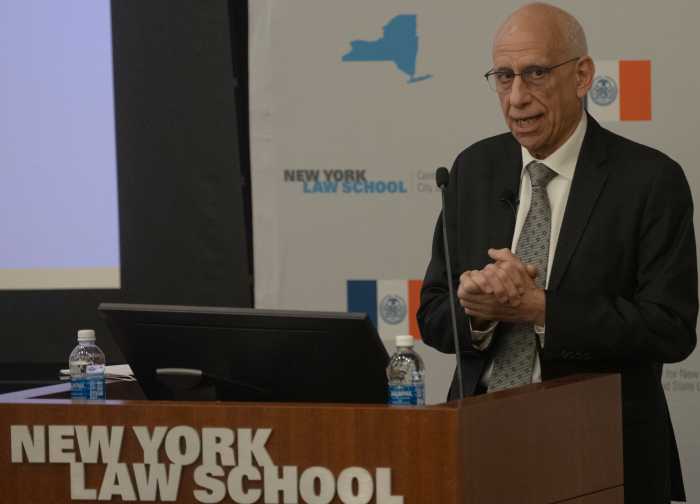When the 250th anniversary of Johann Sebastian
Bach’s death was commemorated by the International Bach Akademie’s
Passion 2000 festival in Stuttgart, Germany, new Passions were
commissioned from four composers.
Two of those works, Tan Dun’s "Water Passion" and
Osvaldo Golijov’s "La Pasion Segun San Marcos" ("The
Passion According to St. Mark"), will have their New York
premieres during the BAM Next Wave festival – "Water Passion"
in December and "San Marcos" on Oct. 30, Nov. 1 and
Nov. 2.
An Argentinean Jew, Golijov might be a peculiar choice to set
the Passion of Jesus Christ according to St. Mark’s Gospel to
music but, as he says in the program notes, his background doesn’t
hinder his understanding of the story.
"I had a big hole in my education – a lack of knowledge
of Christianity," he says in the notes. "That’s ridiculous
considering that I grew up in an officially Catholic country,
with the church being such a big force in Argentinean life. It
has been the best and the worst."
When I heard Golijov’s Passion at the Tanglewood Festival last
August in the Massachusetts Berkshires – conducted by Brooklyn
Philharmonic maestro Robert Spano, who will of course be on the
podium at the BAM Opera House next week – I was struck by Golijov’s
easy synthesis of classical music with the folk music of South
America.
Golijov is immersed in writing a new opera that is to premiere
at next summer’s Tanglewood Festival, where he is composer-in-residence,
and was unavailable for an interview.
At times, the percussion-driven sections of Golijov’s work overwhelmed
the "standard" classical sections, which are relegated
for the most part to Dawn Upshaw’s lovely soprano arias.
For Golijov, composing his own Passion means ignoring the grand
Passions written by Bach in the early 18th century: as sublime
as those masterpieces are, Golijov had to hoe his own road.
"The main thing in this Passion is to present a dark Jesus
and not a pale European Jesus," Golijov continues in his
program notes. "It’s about Jesus’ last days on Earth seen
through the Latin American experience and what it implies. It’s
something that I have to do in the sense that, if you are a Jewish
kid growing up in an officially Catholic country with all your
friends going to Mass, you want to understand that. Luckily,
being a composer allows me to."
This Passion is not Golijov’s first foray into spiritually inspired
music: his latest EMI Classics CD includes the chamber work "The
Prayers and Dreams of Isaac the Blind," played by the St.
Lawrence String Quartet and clarinetist David Krakauer. Its half-hour
length is imbued with a hushed tranquility. But the 90-minute
Passion is his longest and densest composition, employing many
musical changes as it tells the story of Christ’s torture and
death.
"It depends on the situation, because in the Passion his
dual nature is evident," Golijov says. "Sometimes he’s
just a scared man and sometimes he’s God. And sometimes, he’s
angry. There are a lot of emotions that he goes through: sometimes
he loses faith and sometimes he’s magnificent."
Golijov further describes the musical structure of his Passion:
"The instrumentation is mainly voices and percussion. There
is a very strong tradition that news or stories are told by voices
and drums in Cuba and Bahia, Brazil, the geographical centers
of my Passion. The musical tradition comes from Africa – and
that’s how this Passion is being told. The voices represent the
people who don’t understand, who are in fear, and Jesus himself,
who understands but also fears and then doesn’t fear."
One of the biggest differences between Golijov and Bach’s Passions
is the voice of Jesus himself. "Jesus has relatively few
lines in the Passions," Golijov notes. "So Jesus in
Bach is always a bass with a halo of strings. In this Passion,
I thought that most of the time the voice of Jesus would be the
choir, because for me Jesus represents the people transformed
into a collective spirit. At other times, his voice will be the
male soloist and sometimes the female soloist."
In addition to its performance by the Brooklyn Philharmonic,
Golijov’s Passion – at least if it’s the same staging as Tanglewood’s
– will also use onstage costumes and dramatic lighting.
"Well, it’s not an opera," the composer admits, "but
it’s definitely an enactment. There were things like that in
the Middle Ages. It’s very primitive what I’m doing."
Maybe so, yet Golijov’s synthesis of Western classical music
tradition with the indigenous music of Latin America – along
with his glimpse of a Christian tradition through a Jewish sensibility
– make his Passion a unique musical and theatrical event. But
the composer remains modest.
"I want to record, like Rembrandt recorded the Jews,"
Golijov says. "I cannot aspire to be Rembrandt, but if at
least one section of the Passion has the truth about Christianity
that Rembrandt’s paintings have about Judaism, I’ll be all right.
That’s enough."
Osvaldo Golijov’s "La Passion
Segun San Marcos" will be performed – in Spanish and Aramaic
– at 7:30 pm on Oct. 30, Nov. 1 and Nov. 2 at the BAM Howard
Gilman Opera House (30 Lafayette Ave.). For further information
or for tickets, call (718) 636-4100 or visit www.bam.org on the
Web.

























